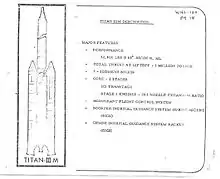Titan IIIM
The Titan IIIM was a planned American expendable launch system, intended to launch the Manned Orbiting Laboratory and other payloads. Development was cancelled in 1969. The stretched core stage was used on some versions of the Titan IIIB and the projected UA1207 solid booster rockets were eventually used on the Titan IV.[1][2]
 Titan IIIM proposal | |
| Function | Expendable launch system |
|---|---|
| Manufacturer | Martin Marietta |
| Country of origin | United States |
| Cost per launch | US$22 million (1965) |
| Size | |
| Height | 39.0 m (128.0 ft) |
| Diameter | 3.05 m (10.0 ft) |
| Mass | 836,560 kg (1,844,300 lb) |
| Stages | 2 |
| Capacity | |
| Payload to 185 km (115 mi) | |
| Mass | 17,000 kg (37,000 lb) |
| Associated rockets | |
| Family | Titan |
| Launch history | |
| Status | Cancelled |
| Launch sites | CCAFS LC-40 Vandenberg AFB SLC-6 |
| Total launches | 0 |
| Boosters – UA1207 | |
| No. boosters | 2 |
| Height | 34.14 m (112.0 ft) |
| Diameter | 3.05 m (10.0 ft) |
| Empty mass | 51,230 kg (112,940 lb) |
| Gross mass | 319,330 kg (704,000 lb) |
| Powered by | off |
| Maximum thrust | 7,116.999 kN (1,599,965 lbf) |
| Specific impulse | 272 s (2.67 km/s) |
| Burn time | 120 s |
| Propellant | Solid |
| First stage – Titan IIIB-1 | |
| Height | 23.99 m (78.7 ft) |
| Diameter | 3.05 m (10.0 ft) |
| Empty mass | 7,000 kg (15,400 lb) |
| Gross mass | 139,935 kg (308,504 lb) |
| Powered by | 2 × LR87-11 |
| Maximum thrust | 2,413.191 kN (542,507 lbf) |
| Specific impulse | 302 s (2.96 km/s) |
| Burn time | 161 s |
| Propellant | A-50 / N2O4 |
| Second stage – Titan IIIB-2 | |
| Height | 8.6 m (28.2 ft) |
| Diameter | 3.05 m (10.0 ft) |
| Empty mass | 2,900 kg (6,400 lb) |
| Gross mass | 37,560 kg (82,810 lb) |
| Powered by | 1 × LR91-11 |
| Maximum thrust | 460.314 kN (103,483 lbf) |
| Specific impulse | 316 s (3.10 km/s) |
| Burn time | 230 s |
| Propellant | A-50 / N2O4 |
Development
- 1969 April 27 - First static test firing of Titan IIIM seven segment solid rocket booster motor. Firing took place at the United Technologies Coyote Canyon test site at the southern edge of San Jose, California,[3] and generated 700,000 kgf (6,900,000 N; 1,500,000 lbf) for two minutes.[1]
Planned flights
- 1970 - Uncrewed Gemini-B/Titan IIIM qualification flight
- 1971 - Uncrewed Gemini-B/Titan IIIM qualification flight
References
- "Titan 3M". Astronautix.com. Archived from the original on August 20, 2016. Retrieved 25 June 2016.
- Shayler, David J. (2002). "Military Gemini". Gemini: Steps to the Moon. Springer-Praxis. ISBN 1-85233-405-3.
- Rogers, Paul (6 October 2014). "Historic Silicon Valley site becoming new public open space preserve". San Jose Mercury News. American Geophysical Union. Retrieved 31 December 2018.
This article is issued from Wikipedia. The text is licensed under Creative Commons - Attribution - Sharealike. Additional terms may apply for the media files.
